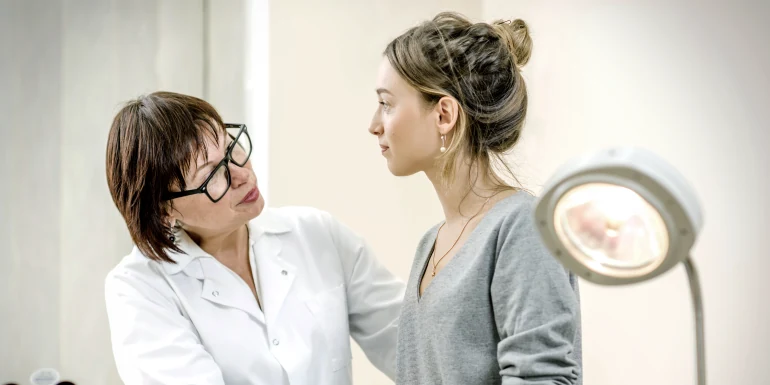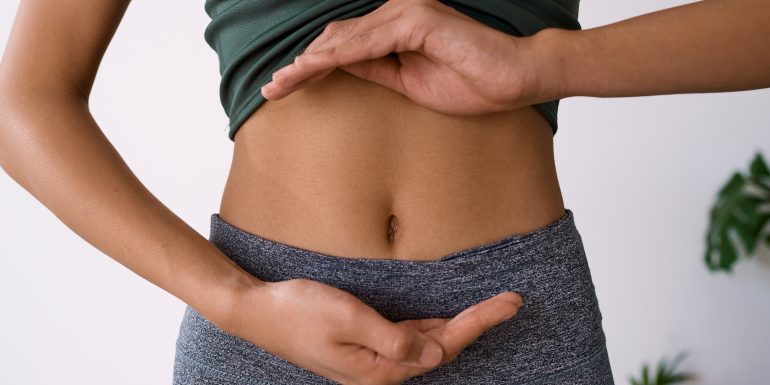
PMS: definition, symptoms and treatment
What helps combat nausea before your period? What is PMS and when does it start? When is the syndrome at its worst? Information about premenstrual syndrome and how it can be treated.
What is PMS?
The medical term “premenstrual syndrome” (PMS) covers a variety of symptoms that occur during a particular phase of the menstrual cycle. PMS is a significant issue for many women. Roughly 20% to 40% of girls and women experience symptoms of PMS and feel that it limits their lives.
When does PMS start?
PMS always starts in the second half of the menstrual cycle, between ovulation and menstruation. How many days before their period do sufferers start to experience signs? The first symptoms occur about 10 to 14 days before menstruation, and reach their peak in the days leading up to it. The symptoms of PMS subside again during the period itself.
The most severe form of PMS is premenstrual dysphoric disorder (PMDD), the symptoms of which include depression, poor concentration and unusually impulsive behaviour. Approximately 3–8% of women are affected by this. The exact cause of PMDD is unknown. One factor is probably a genetic hypersensitivity to the sex hormones oestrogen and progesterone. Serotonin metabolism disorders could also be a cause. Women with PMDD are at high risk of postpartum depression after the birth of a child.
PMS: what causes it?
Science is currently unable to explain why PMS occurs in the course of a woman’s cycle. Researchers suspect that the syndrome is triggered by an imbalance in the female hormones oestrogen and progesterone. PMS may well be due to a lack of progesterone. The hormonal imbalance reduces the levels of serotonin (the happiness hormone).
What are the symptoms of PMS?
The symptoms of PMS can vary. This list provides an overview:
- Abdominal pain: the abdominal pain typical of PMS is caused by prostaglandins. These are substances released by the body during menstruation that cause the uterus to contract, resulting in the characteristic period pains
- Breast tenderness: in the second half of the cycle, the hormone oestrogen stimulates the growth of breast duct tissue. The breasts are more sensitive to touch. You may experience pain in your breasts before your period.
- Intestinal problems: medical professionals think that oestrogen affects the cardiovascular system, the metabolism of fat and sugar, and the intestines. Flatulence and the typical feelings of nausea are possible before your period. You can sometimes suffer from constipation before your period, as well as PMS-induced diarrhoea.
- Weight gain: one reason you may gain weight before your period are edemas. These are accumulations of fluid in the breasts, eyelids, hands and feet before your period. Fluid can also accumulate in your legs. This is because the walls of your capillaries allow proteins through, which means that protein and fluid can get into the connective tissue. This leads to deficiencies in the blood vessels. The body reacts by immediately producing a wide range of hormones. These then retain body fluids and salt, which reduces their excretion. The accumulations build up slowly but steadily.
- Circulatory problems: you can experience dizziness before your period if your hormones are imbalanced. That’s because the hormonal imbalance affects your cardiovascular system, causing the circulatory complaints associated with PMS. That’s why tachycardia is also a symptom of PMS.
- Aching muscles and joints: strong cramps in the womb can have an effect on the surrounding muscles. These can then spread to the back and joints in cases of PMS, resulting in shooting pains and aching joints. This can give you back pains before your period.
- Skin blemishes: this is another case in which hormones are to blame. The oestrogen level drops rapidly and testosterone comes into play instead. This testosterone stimulates the sebaceous glands, resulting in oily skin, clogged pores, and therefore spots in the run-up to your period.
- Fatigue: levels of oestrogen and progesterone drop before your period. Both of these hormones influence your energy levels. Falling levels of these two hormones can lead to PMS-related fatigue.
- Sleep problems: in certain cases, PMS can lead to problems sleeping. Researchers have found that the levels of ovarian hormones change throughout the menstrual cycle, which causes PMS-induced insomnia. The level of melatonin in the female body is also lower during this phase of the cycle. Melatonin is the most important hormone for healthy sleep.
- Headaches: both the increase in hormones and their decrease shortly before menstruation can trigger PMS-related headaches in certain cases. Some women also suffer from menstrual migraines. These are not symptoms of PMS experienced before your period: they are a separate diagnosis.
- Food cravings: shortly before your period, the body works particularly hard and your metabolism speeds up, meaning it requires up to 350 additional calories. This causes you to experience food cravings as a symptom of PMS. The appetite of those affected, particularly for sweet food, is increased. Low magnesium levels and the stress hormone cortisol are other reasons for food cravings.
- Hot flushes: PMS also manifests itself in increased perspiration and hot flushes. Before menstruation, the body’s temperature regulation goes haywire. Also, oestrogen levels are at their lowest at this time.
- Chills: it is not uncommon to feel cold when experiencing PMS. Some sufferers even get chills.
- Mental issues: PMS causes a number of different mental symptoms. Many women experience mood swings before their period. PMS can also cause depressive episodes in some cases. PMS-related depression takes the form of low mood, a need for solitude and feelings of sadness. PMS can sometimes give rise to feelings of anxiety.
Are you unsure whether you’re affected by premenstrual syndrome? Keeping a period journal can help. For several months, make a note of whether you experience certain symptoms before your periods. Keep a record of the symptoms that you notice, then talk to your gynaecologist about it.
PMS shares many symptoms with early pregnancy. As a result, it is not that easy to tell the difference between premenstrual syndrome and the early stages of pregnancy. The symptoms that are similar include fatigue, headaches, mood swings, intestinal problems and nausea. But there are differences: In pregnancy, nausea is often accompanied by vomiting, particularly in the morning. A pregnant woman’s breasts tend to be more sensitive than is the case with PMS. Pregnant women are often sensitive to certain smells. This is not the case with PMS. You should talk to your gynaecologist if you are not sure whether you have PMS or you are pregnant.
By the way: PMS can be more pronounced after giving birth in some cases. This is because hormone levels remain elevated for a while. It takes some time for them to return to normal. You should consult a healthcare professional if you suffer particularly severe symptoms of PMS after pregnancy.
PMS: when should you see a doctor?
You should seek out a doctor if the symptoms of PMS persist after your period. If you experience the symptoms of PMS without getting your period, there may be a different cause. Other triggers could include depression, hypothyroidism or endometriosis.
The symptoms of PMS are much more severe in the menopause. The duration of women’s cycles also fluctuates, and they may experience spotting. Once the menopause is over, PMS also becomes a thing of the past.
Talk to your gynaecologist if you feel that your symptoms limit your life. You may be able to treat them with medication.
PMS: what can you do about it?
There are a number of different remedies to alleviate the symptoms of PMS. So what helps against PMS and its individual symptoms?
Alleviating abdominal pain in connection with PMS
Heat helps with abdominal tenderness and cramps. Put a hot water bottle on your stomach or take a warm bath. Alternatively, you can apply a heat patch. Gentle exercise like Nordic walking, hiking, cycling or yoga can also help relax the womb’s muscle contractions. Anti-spasmodics can help with severe PMS symptoms. PMS medications to treat abdominal pain contain substances such as ibuprofen. Natural remedies are another good option if you are suffering from PMS-related abdominal pain. You could for example try tea made from lady’s mantle, silverweed, yarrow or chamomile.
PMS: Treating breast pain
Breast pain is particularly common with PMS. What can you do to prevent it? Quark compresses are good if your breasts are tender or particularly sensitive to touch. They are cooling and reduce swelling. Spread some quark on a towel. Fold the towel to avoid getting quark on your skin. Alternatively, fill a compress with quark. Lay the towel or compress on your breast and place another towel on top of it. Leave everything in place for about 20 minutes. Take monk’s pepper as a natural remedy for PMS-related breast pain. Monk’s pepper is available as a tea, capsules or drops.
PMS: treating intestinal problems
Do you experience bloating as a result of PMS? Eating a healthy diet and getting plenty of exercise will relieve your symptoms in the days leading up to your period. Suitable stomach-friendly foods include rice, fish and ripe bananas. You should also avoid sugar, caffeine and nicotine. If PMS is making you flatulent, massage your stomach gently and use a hot water bottle or cherry stone pillow. You should also make sure that you are drinking enough water, and take a tablespoon of psyllium husks every day. This will help you avoid any PMS-induced constipation. Ginger tea helps against nausea in cases of PMS. Teas containing savory or peppermint are also good for the typical intestinal problems. Mallow teas even help against heartburn.
Remedies for water retention in cases of PMS
A diet that is low in salt and high in diuretic foods helps prevent water retention. Foods such as cucumbers, melons, pineapples, strawberries and asparagus are good in this regard. Teas containing birch leaves, ginger, nettles, dandelion or coriander are a natural way to alleviate water retention, and may combat PMS-related weight gain.
Alleviating circulatory problems in cases of PMS
Eating regular meals helps combat feelings of dizziness in connection with PMS because it stabilises your blood sugar levels. Going for walks in the fresh air also alleviates the symptoms of PMS. If the dizziness is severe, drink half a litre of water in small sips. You should also eat a piece of chocolate or dextrose. This will get your circulation going. What else helps against dizziness caused by PMS? Drops containing camphor or hawthorn help with circulatory complaints. Take them in accordance with the manufacturer’s instructions.
PMS: treating aching muscles and joints
Heat is particularly beneficial if PMS leads to aching muscles and joints. Fill up your hot water bottle or heat up a cherry stone pillow. If you are experiencing back pain due to PMS, apply the heat to your back. Either the hot water bottle or the pillow can simply be placed on the part of your body that hurts. You can also take a bath with a lemon balm bath soak, or apply St John’s wort oil to the affected area. A ginger poultice can also provide relief. You can make one by putting some crushed ginger onto a towel. Then, lay the towel on your back.
Avoid getting spots before your period
Along with regular cleansing, drying sulphur paste or clay applied to the skin at night can help. You can cleanse your face gently with a facial steam bath or an enzyme peel. If you have severe acne, you should seek medical treatment. A steam bath with chamomile, marjoram, sage, thyme, aniseed, parsley, rosemary or yarrow is an effective remedy for this symptom of PMS.
Fatigue with PMS: treatment
If you feel tired before you get your period, you should make sure that you drink enough water (ideally about 2.5 litres per day). Even moderate exercise will boost your energy. You should also make sure that you’re getting enough sleep. Drinking teas with peppermint or rosemary and green tea is a natural way to fight fatigue.
PMS: preventing problems with sleeping
Eating a low-calorie diet before your period can help improve the quality of your sleep. You should therefore avoid unhealthy foods and foods that are high in sugar, like chocolate, crisps or pizza. A study found that women who eat a lot of plant-based products reduce the side effects of PMS by 76%. What else can you do to combat insomnia caused by PMS? Drink tea containing valerian, hops, lemon balm, lavender or passion flower.
Alleviating headaches in connection with PMS
The contraceptive pill is considered an effective remedy for PMS-related headaches. Conventional painkillers like ibuprofen or paracetamol also usually help. Two to three drops of peppermint oil on the forehead and temples can help with tension headaches. Tea containing meadowsweet, feverfew, lavender, ginger or willow bark may also provide some relief.
Avoiding food cravings with PMS
Pay attention to what you eat. Fresh fruit and vegetables, wholegrain products and potatoes contain an abundance of vitamins and minerals. Fish is generally preferable to dairy products and meat. Ginger tea, peppermint tea and Jerusalem artichoke also help you beat the cravings.
Preventing hot flushes with PMS
The contraceptive pill is considered an effective remedy for PMS-related headaches. Conventional painkillers like ibuprofen or paracetamol also usually help. Two to three drops of peppermint oil on the forehead and temples can help with tension headaches. Tea containing meadowsweet, feverfew, lavender, ginger or willow bark may also provide some relief.
Treating chills before your period
You can alleviate chills with a warm foot bath and a thick blanket. You could enjoy a cup of tea at the same time, and make sure you drink enough water.
What can you do about mood swings when you have PMS?
If you suffer from mood swings in the second half of your cycle, a walk in the fresh air can often do you more good than a hot water bottle in bed – even though you might struggle to find the motivation. In addition to light endurance training, yoga is also good. You should also set aside time for regular islands of calm during your day, particularly if you tend to experience mood swings during your cycle. Meditation and mindfulness exercises can often work wonders when it comes to mood swings due to PMS and hormone-related irritability.
Preventing the symptoms of PMS
By following a healthy lifestyle, you can alleviate or even completely prevent the symptoms of premenstrual syndrome. It’s important that you keep active and do regular exercise, and eat a balanced diet with plenty of fruit and vegetables and small quantities of sugar and animal fats. Avoid caffeine and alcohol, as well as food with high amounts of sugar and salt, because these may exacerbate the symptoms of PMS that occur during your cycle. Try opting for foods containing vitamin B6, magnesium and calcium instead. Vitamin B6 can be found in wholegrain products, corn, broccoli and spinach. Sunflower seeds, almonds and brown rice are good sources of magnesium, and kale is packed with calcium.
You should also avoid stress. Consciously taking time out or relaxation breaks can help you keep your stress levels under control. The important thing is to find your own healthy rhythm, including with regard to your cycle. There are many effective ways of dealing with PMS. Follow our tips to alleviate your symptoms. Some potentially helpful complementary therapies include naturopathy, traditional Chinese medicine (TCM) and osteopathy. Talk to your doctor if you’re unsure and need further assistance.

The expert provided the editorial team with advice and input for this article. Nadia Cifarelli (BSc Psychology, certified holistic health advisor) works for the Helsana health consultation service. She helps customers on issues to do with prevention, nutrition and mental health.


Newsletter
Find out more about current health issues every month and get all the information you need about our attractive offers from all Helsana Group companies * delivered by e-mail to read whenever it suits you. Our newsletter is free of charge and you can sign up here:
We did not receive your information. Please try again later.
* The Helsana Group comprises Helsana Insurance Company Ltd, Helsana Supplementary Insurances Ltd and Helsana Accidents Ltd.